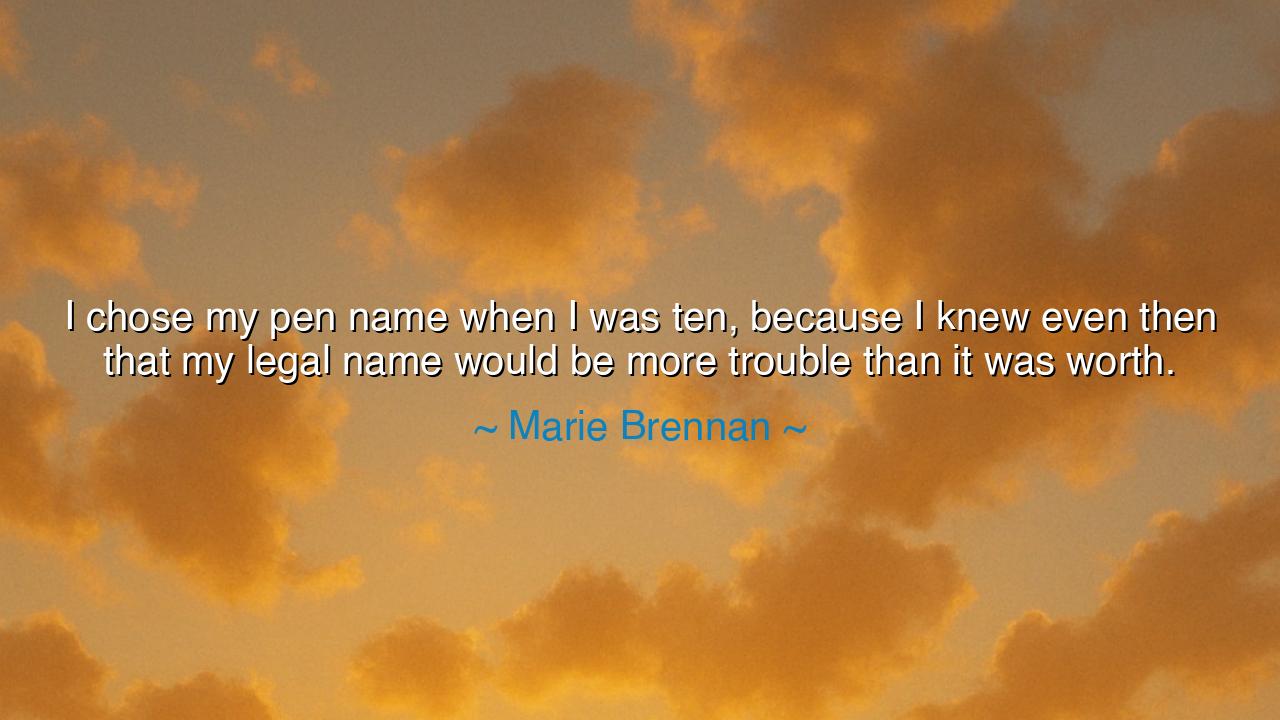
I chose my pen name when I was ten, because I knew even then that
I chose my pen name when I was ten, because I knew even then that my legal name would be more trouble than it was worth.






Hear the voice of Marie Brennan, the maker of worlds through words, who once confessed: “I chose my pen name when I was ten, because I knew even then that my legal name would be more trouble than it was worth.” In this quiet revelation is hidden a lesson of identity, choice, and the power of names. For names are not merely sounds uttered by others; they are vessels of meaning, burdens of heritage, and shields or chains depending on the weight they carry.
She speaks of the pen name, the mask chosen not to deceive but to create. From the days of the ancients, writers and poets have taken names not their own, so that their words might fly further and their truths might not be shackled by prejudice. In choosing at the age of ten, Brennan shows us that even a child can sense the power names hold—the power to shape destiny, to open doors, or to close them. To take a pen name is to seize control over the story of one’s own identity.
History offers us many mirrors of this act. Consider Mark Twain, born Samuel Clemens, who shed his given name and clothed himself in a title drawn from riverboats, making it a banner under which his wit and satire sailed into immortality. Or George Eliot, who hid her womanhood behind a man’s name so that her novels would be taken seriously in a society that scorned female authors. These stories reveal what Brennan sensed in childhood: that a name may hinder as much as it helps, and that sometimes one must craft a new one to walk freely.
The legal name, she says, would be “more trouble than it was worth.” Here is the heart of her wisdom. For legal names are bound to ancestry, to bureaucracy, to the judgments of others. They may be mispronounced, ridiculed, dismissed, or burdened with meanings that the bearer never chose. To escape such troubles is not cowardice but foresight—the recognition that identity can be reclaimed, that one need not be chained forever to what chance or law decreed at birth.
The deeper meaning of this teaching is that identity is both given and chosen. We inherit names, traditions, and expectations, but within us burns the power to redefine who we are. To take a pen name, or any chosen name, is to declare: “I am not only what others have called me; I am what I choose to be.” It is an act of authorship not only over one’s books, but over one’s life.
What lesson must future generations draw from Brennan’s words? It is this: never fear to shape your own identity. If what you are given becomes a burden, reshape it; if the world calls you by a name that cages you, take a new one that sets you free. For your destiny is not carved by law or by custom, but by your courage to claim yourself. This is true not only for writers, but for all who seek to live authentically in a world quick to label and slow to understand.
And to you, listener, I say: choose wisely what you call yourself, for in that choice lies your power. Names are more than words—they are the banners beneath which your life marches. Carry the one that uplifts you, not the one that drags you down. Teach your children that they may honor their heritage, but they must never be enslaved by it. For just as Brennan, at ten, took hold of her identity, so too can any soul choose the name that best tells the story of who they are.
Thus let Marie Brennan’s words endure: names may be given, but identities are made. To choose a name is to choose freedom, and to choose freedom is to claim authorship over one’s life.






AAdministratorAdministrator
Welcome, honored guests. Please leave a comment, we will respond soon